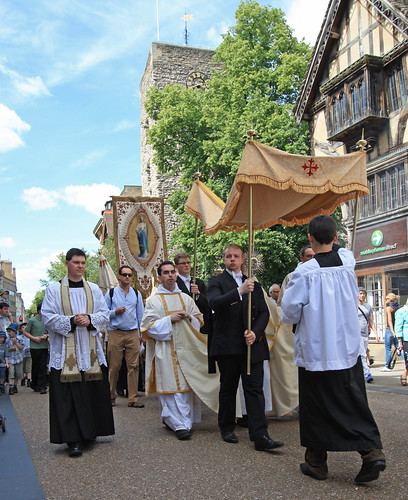_and_USS_Saratoga_(CV-60)_underway_crop-751596.jpg)
Tuesday, June 30, 2009
New Series - Cardinal Virtues and their Allies
_and_USS_Saratoga_(CV-60)_underway_crop-751596.jpg)
Monday, June 29, 2009
The Year of Paul, 29 June 2008-2009
 Godzdogz celebrated the Year of Saint Paul in a number of ways. There was a post to introduce the year and reflections for the feast of Saints Peter and Paul in 2008 and for the feast of the Conversion of Saint Paul in 2009.
Godzdogz celebrated the Year of Saint Paul in a number of ways. There was a post to introduce the year and reflections for the feast of Saints Peter and Paul in 2008 and for the feast of the Conversion of Saint Paul in 2009.Thursday, June 18, 2009
Corpus Christi Procession in Oxford

For the last ten years, the north Oxford deanery has held a Corpus Christi Procession that begins in the Oxford Oratory (St Aloysius) and makes its way through the centre of Oxford to the Oxford University Catholic Chaplaincy. En route, the procession stops in Blackfriars priory church, where the friars greet the Blessed Sacrament by singing the sequence 'Lauda Sion', written by St Thomas Aquinas. A sermon is then preached before the procession continues on its way.
This year's procession had a significant Dominican involvement. fr Richard Ounsworth OP preached the sermon, in which he likened the Eucharist to a mother breast-feeding, and thus giving her very life to her child. So it is when Mother Church gives us the Bread of Life. He also recalled Christ's Passion, which the Mass recalls, and said we should consider ourselves blessed, if, when we processed with the Lord through the city, we might even be mocked and so share in Christ's sufferings.
The procession walked past the Ashmolean Museum and down Cornmarket, one of Oxford's busiest shopping thoroughfares. On either side of the Blessed Sacrament were the deacon, fr David Rocks OP, and the acolyte, fr Robert Gay OP. The Blessed Sacrament was carried from the Oratory to Blackfriars by Fr Robert Byrne, Cong. Orat., Provost of the Oratory, and then from Blackfriars to the Chaplaincy by fr Benjamin Earl OP. fr Benjamin also gave Benediction at the close of the Procession which took place in the Chaplaincy's main hall.
Below are photos from the procession:

Fr Dominic Jacob, Cong. Orat., with some Dominicans who had gathered in the Oratory church for the start of the procession. Behind the friars is Sr Louise OP who made her final profession in March and who has recently joined the sisters' community in Oxford.

The Blessed Sacrament is exposed on the altar of St Aloysius' church

The priory church is packed for the Corpus Christi sermon

fr Richard Ounsworth OP preaching the sermon

fr Benjamin Earl OP incenses the Blessed Sacrament in Blackfriars priory church

The procession leaves the choir

The Procession goes past the Sackler Library on St John's Street

The canopy over the Blessed Sacrament is carried by four students of the University

The procession in Cornmarket, passing some of Oxford's oldest landmarks

fr Benjamin Earl OP, assisted by his Dominican brothers, incenses the Blessed Sacrament at its final station in the Chaplaincy

Fr Benjamin blesses the people with the Most Holy Eucharist

The procession ends in the Chaplaincy building with the singing of the 'Salve Regina'
Wednesday, June 17, 2009
Ministries, Charisms, Fruits - 22 Self-control

People can often be put off Christianity by a perception that it makes moral demands on its followers which it is impossible to live up to: “there’s no way I could manage that,” they might say, “so why bother trying?”
When St Paul teaches us in Galatians 5: 22 that self-control is one of the fruits of the Holy Spirit, he reminds us that things don’t quite work like that. You don’t have to be perfect before you even think about becoming a Christian: rather, it is the participation as a Christian in the life of God which enables you to grow in the way of perfection. Yes, the moral life is a struggle (but then that’s true even if you’re not a Christian – there are always things you know you ought to do even if you don’t particularly feel like it); however, it is by allowing God to work in us through the Holy Spirit, given at baptism that we acquire the strength we need to engage in that struggle. Now, that doesn’t mean that, the moment you’re baptised, you’ll immediately be perfectly self-controlled: after all, the Christian life is about a process of growth in the love of God and neighbour which lies at the heart of choosing to do the right thing. What it does mean, though, is that, in a sense, the person who said “there’s no way I could manage that” was right – we can’t make ourselves perfect through our own effort, we need the grace of God.
This is a useful reminder, too, for those of us who are already Christians, and who find ourselves from time to time, perhaps often, subject to all kinds of temptations and feel too weak to resist. If self-control is a gift of the Holy Spirit, then resisting temptation is not just a question of gritting our teeth and not giving in through sheer effort on our part: rather, we should seek to draw close to God in prayer, and especially in the Sacraments, in which he shares his life with us. In doing so, we allow the Holy Spirit we received at our baptism to work more fully in our lives, and thus our self-control grows as the fruit of his operation in us.
Monday, June 15, 2009
Ministries, Charisms, Fruits -21-Gentleness
 Nothing is so strong as gentleness, nothing so gentle as real strength - St. Francis de Sales
Nothing is so strong as gentleness, nothing so gentle as real strength - St. Francis de SalesGentleness is not often associated with strength. An alternative translation of praotes, the Greek word used by Paul, is meekness. Neither of these translations suggests strength. Far too often the opposite is assumed: to be gentle is to be delicate, weak and even feeble. The concept of gentleness does not seem to fit into the dog-eat-dog world we live in. However, gentleness, properly understood, is far from these negative connotations. To be gentle is to be in control of oneself. It is to have a balanced and tranquil spirit. It is to be even-tempered, and to have hold over the passions. The gentle person is the master of their strength and power. The Latin Vulgate expresses this by using the compound mansuetudo - being accustomed to taming the hand. Gentleness is being appropriately restrained in our actions and words, especially in our interactions with other people. We all recognize how hard it is to practise this virtue. Sartre said “hell is other people” and all too often we might feel that he is right. But because it is difficult we need the Holy Spirit to aid us in being gentle.
Saturday, June 13, 2009
Ministries, Charisms, Fruits - 20 Faithfulness
Thursday, June 11, 2009
Ministries, Charisms, Fruits - 19 Goodness

Monday, June 8, 2009
Ministries, Charisms, Fruits - 18 Kindness
 Aristotle describes kindness as helpfulness towards someone in need, not in return for anything, nor for the advantage of the helper himself, but for that of the person helped. Of course, we have to be careful with such a definition. Just because we help someone without regard for any personal advantage, it doesn’t mean we have to be miserable as we help. It is more virtuous to delight in being helpful rather than finding it a burden, but it is essential that kindness springs from a love of others.
Aristotle describes kindness as helpfulness towards someone in need, not in return for anything, nor for the advantage of the helper himself, but for that of the person helped. Of course, we have to be careful with such a definition. Just because we help someone without regard for any personal advantage, it doesn’t mean we have to be miserable as we help. It is more virtuous to delight in being helpful rather than finding it a burden, but it is essential that kindness springs from a love of others.Careful consideration also has to be given to what it means to be helpful. Aquinas talks of kindness as something that helps to cure evils. In any kind of evil situation, there is something that is lacking, and so some form of help is needed to restore what is missing. In situations such as rivalry, hatred, jealousy and discord, our response should be kindness, an act of helping those in need. But the kind of help we provide is informed by our Christian faith. Christ died on the cross for our sins and He is conqueror over all evil. Therefore whenever we are confronted with evil, we need to bring Christ into the situation.
Friday, June 5, 2009
Ministries, Charisms, Fruits - 17 Patience

We look at how patient Jesus was with the multiple mess ups of Peter and the other disciples. How often they just did not understand him. Patience is such an important virtue in so many situations. Patience in discussions and heated debate is important because it is a simple recognition of the fact that elements of truth may be found on all sides. Patience with the mistakes and gaffs of others is also a simple recognition that we are not perfect either and appreciate patience and forgiveness when we make mistakes. Patience in suffering comes from an understanding that God will ultimately work for our good and that the horizon of time for the Christian is not this life but eternity.
Wednesday, June 3, 2009
Dominicans 'Keep the Door Open' in Edinburgh

This year the celebration of Pentecost in the University Parish of St Albert the Great, Edinburgh, was a little different. Bringing the entire community together for a single weekend Mass, an unprecedented chapel project, ‘Keeping the Door Open’, was launched. The project is to build a new chapel for the growing community and so increase the capacity of the existing space. This is the largest community project in the history of Edinburgh University Catholic Chaplaincy.
Fr Bruno Clifton OP, Assistant Catholic Chaplain (and a former Godzdogz contributor, pictured left), writes that 'the parish filled the nearby Convent of Mercy, St Catharine’s, to mark the Feast together, acknowledging our unity in the Holy Spirit in preparation for the largest building project the Parish has ever undertaken. The Chaplaincy has been served by Dominicans since 1931, and the Provincial, Fr John Farrell OP, presided and preached at the Mass'.
The Prior and Parish Priest of St Albert the Great, Fr Tim Calvert OP, spoke of the task ahead as an opportunity to bring the growing community together. ‘There are many communities surrounding the Chaplaincy: students, alumni, staff and parishioners who feel at home with the Dominicans. At Pentecost we are called to recognise our deeper unity in the Spirit and this project is a tangible means of expressing this unity.’
In honour of the special event the Parish commissioned some new music. Fr Bruno composed a motet, Veni Sancte Spiritus, which received its premiere at the Mass. More information about the project can be found at http://keepingthedooropen.op.org/
Tuesday, June 2, 2009
Ministries, Charisms, Fruits - 16 Peace
 "Those who abide in me and I in them bear much fruit" (John 15:5), and one of those fruits, which we receive from Jesus if we dwell in him and draw our strength from him, is peace. In St Paul's Letter to the Galatians 'peace' translates the Greek, eirene. Peace is a result of a life animated by the Holy Spirit, but it comes from Christ who has brought peace and reconciliation to the world by his passion, death and resurrection. Thus we are reminded in the Mass of the words of the Risen Lord: "Lord Jesus Christ, you said to your apostles: I leave you peace, my peace I give you" (see John 14:27; 20:19-23).
"Those who abide in me and I in them bear much fruit" (John 15:5), and one of those fruits, which we receive from Jesus if we dwell in him and draw our strength from him, is peace. In St Paul's Letter to the Galatians 'peace' translates the Greek, eirene. Peace is a result of a life animated by the Holy Spirit, but it comes from Christ who has brought peace and reconciliation to the world by his passion, death and resurrection. Thus we are reminded in the Mass of the words of the Risen Lord: "Lord Jesus Christ, you said to your apostles: I leave you peace, my peace I give you" (see John 14:27; 20:19-23).These words of the Lord teach us that the life which is conformed to the Cross of the Lord, which becomes more Christ-like, receives Christ's peace. And what is the peace Paul has in mind? In Philippians 2:2 he asks the Philippians to be "of the same mind, having the same love, being in full accord and of one mind", this being the one mind of Jesus Christ. It is thus that St Paul exhorts the Philippians to put aside their quarrels and pride, and to imitate the Lord's humility who emptied himself of his equality with God and became a slave and was obedient even to the point of accepting death on a Cross (see Philippians 2:1-18). Hence, peace is being ordered to the mind of Christ which "in humility [counts] others better than [ourselves]".
It is in view of this Christ-centred orientation that St Augustine says that "peace is the tranquility of order". Because peace is ordered towards Christ and the eternal Good it is unlike worldly peace which is more like "a break between wars". Christ's peace infinitely surpasses the fragility of our uneasy treaties and efforts at a truce. It is ordered towards lasting joy in heaven. It is true, never deceptive, and as St Thomas Aquinas notes, it assures peace within ourselves, and in our relationships and surroundings. Such peace, of course, is the peace that the saints enjoy in heaven, and which is ultimately the goal of all our human aspirations for peace. It is not mere coincidence that the universal symbol for peace is a dove, which is also a way of depicting the Holy Spirit, the giver of true peace.
For perfect peace - conformity with Christ - comes not by our efforts but because of Who has been given to us in baptism. The peace which the Risen Christ leaves us is a Person: it is the Holy Spirit, whose work is peace, for the Spirit orders all things according to the mind of Christ. As the Lord said, "he will glorify me, for he will take what is mine and declare it to you" (John 16:14). And so, the peace of Christ is ours, who are called to be saints (see Romans 1:7) and who have been given the Holy Spirit. For the Spirit is the fruit of the unity and love of the Father and the Son, and he is the one who makes us Christians of one heart and mind with Christ, who is perfectly ordered to the will of the Father. Thus, St Paul urges us to "maintain the unity of the Spirit in the bond of peace" (Ephesians 4:3), for peace - with the unity, concord and harmony that it entails - is a sign of the Spirit at work in our lives and in our Christian communities. Therefore, Christ said: "you will know them by their fruits" (Matthew 7:16), and one fruit St Paul desired for his churches, and which we pray for repeatedly, at every Mass, is peace.